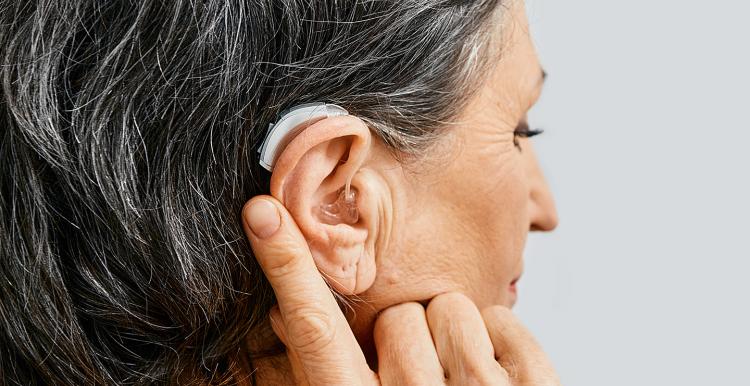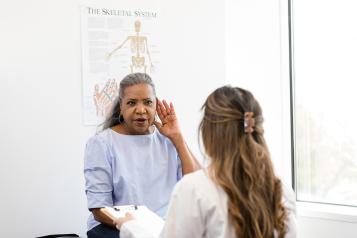Hearing conditions and hearing loss

This article is based on a presentation made to Healthwatch in March 2022 by Mr Joseph Manjaly, Consultant Otologist, Hearing Implant & ENT (Ear, Nose, and Throat) Surgeon at The Royal National ENT Hospital & University College London Hospitals NHS Trust.
Hearing loss
Having hearing loss can be linked to dementia for older people, and for children can cause delayed language development and under performance in school.
Hearing loss is very common and so it is likely to affect you or someone you know, but it can be more hidden, and less obvious, than visual impairment, and other conditions.
Communicating with people with hearing loss
Some tips for communicating with people with hearing loss can include speaking in their eyeline so they can possibly lip-read, see gestures, and pick up the sounds of your voice more easily, and to do this in an environment with good lighting.
This has been made more difficult by the need to wear face masks.
RNID - How to communicate with someone who is deaf or has hearing loss
Hearing loss in one ear
Hearing loss in one ear is common and can impact on ‘localisation’ (our ability to locate the source of a sound). If only one ear can hear it’s harder to ascertain the direction sounds are coming from. For example, when you misplace your mobile, but can hear it ringing, hearing via both ears will make it easier to locate. It can impact on our ability to cross the road safely. Conversation in noisy environments can be difficult. Using both ears helps you to do this, but for those with loss in one ear, noisy venues can be off putting and make people reluctant to engage.
You’ll get tired more quickly when relying on one ear as you’ll be using the brain more to hear with one ear.
What to do if you are concerned about your hearing
If you have a concern, get things checked. Sometimes an ear infection can be a sign of something more serious, so it’s always good to get these things checked out. The first point of contact is usually your GP.
Types of hearing loss
There are various types of hearing loss, ‘conductive hearing loss’ (where sound is not reaching the inner ear) and ‘inner ear hearing loss’ (where there is a problem in either the inner ear or the auditory nerve) will be treated in different ways. Hearing tests measure natural hearing and bone conduction to help ascertain where the hearing loss is caused and whether surgery could help. Ear anatomy is delicate and can make people concerned about surgery related to hearing loss. So it is important to explain this to patients in a way that is clear.
Ear surgery
Ear surgery has developed a great deal over the years and can be done quickly, without the need for overnight stays. Some ear surgery can be done for the patient whilst they are awake, for a quicker recovery and to test the hearing whilst the operation is in progress. There are risks with all surgery so the decision is carefully made between the clinician and the patient to weigh up the advantages, and the risks.
If it is not possible to do surgery, a hearing aid may help. Not everyone can have one.
Implants
Implants might be considered when a conventional hearing aid isn’t suitable or isn't tolerated (the hearing aid causes recurrent infections).
These are much more straightforward now than when they were first introduced. These procedures can be done under general anaesthetic.
Hearing loss in children
Some conditions are more prevalent in children, for example, glue ear. A child with this may seem inattentive or may have the TV up very loud. But ‘glue ear’ can be resolved with the insertion of a grommet to clear out the blockage. After a year the body will push out the grommet. Left without treatment this could worsen and impact on the child’s education.
Other causes of hearing loss
Other causes of hearing loss include working in an industry with loud noise, genetics (lots of genes are implicated) and ageing, which impacts most on our high frequency hearing. It’s insidious so you may not notice the deterioration for some time. We believe that aging impacts on our hearing because our hearing relies on tiny hairs in the ear canal picking up electrical signals and these can thin over time, like the hair on our head. They thin out differently for different people. To protect your ears there are noise at work regulations for those exposed to loud noises at work. We should limit loud noise exposure, wear ear defenders, heed warnings from headphones about maximum volumes, not sleep with headphones in and not use cotton buds in the ear. Unlike for other health conditions, diet and exercise won’t impact on our hearing.
Sudden hearing loss
For sudden hearing loss, it’s important to seek medical help urgently.
If it’s a hearing loss in the inner ear, steroids may be able to rescue it. But after 3 months the steroids won’t work. The GP can do a tuning fork test to ascertain which type of loss you have.
Newborn babies
Newborn babies have their hearing tested at birth. Clinicians can screen them whilst they are sleeping and the test is easy, quick to do and can test for profound and mild hearing loss. There isn’t routine hearing testing offered in the NHS for adults, so the advice is simply to have ears tested if you notice a change in your ability to hear.
Cochlear implants can be given at birth to enable children to learn language (post 4 or 5 their brain won’t have the processing capacity to learn it). This can be a sensitive issue for Deaf parents as Deaf families may not want their child to be different to them, potentially having a different mother tongue. These decisions are taken with the family. 90% of children born Deaf have hearing parents.
Difficulties with ear examinations
Ear examination is not that easy, even for specialists. It can be hard for GPs because of the more limited equipment available within primary care. So, GPs have to make a best assessment based on the tools they have. Usually drops first and then a decision about where to send the patient; Audiology, Audiovestibular or Ear, Nose and Throat (ENT) services. And then specialists will check in with each other to make sure people are in the right place. As a result, it can take some time to get an appointment, an assessment, and a plan. The method of testing for hearing loss has historically required a specialist booth, limiting the venues where tests can be carried out. However, new testing equipment can be set up in a greater variety of venues.
Better access to hearing assessments
A new pathway is being trialled for Enfield patients, where patients can self-refer to a specialist for assessment to speed up the process. There is evidence that this is shortening the pathway, and waiting time, in the pilot. The next step for the pilot programme will be to demonstrate the effectiveness of this new referral route to North Central London commissioners (and then nationally). So we may see these changes in Islington soon.
Research into hearing loss is ongoing. As well as tools like hearing aids and implants, research is being conducted into using drugs to reverse hearing loss (similar to the use of steroids for inner ear canal hearing loss if caught early). But there is still some way to go on this.
Other useful information
NHS guidance on hearing loss:
Free hearing check, and advice and information:


